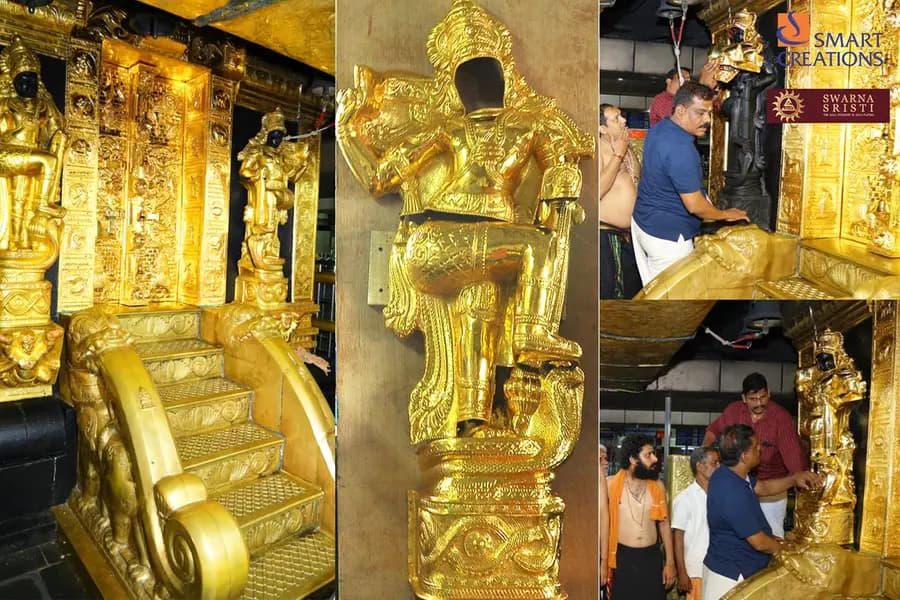We're loading the full news article for you. This includes the article content, images, author information, and related articles.
An investigation into gold theft at India's revered Sabarimala shrine now has Kenyan relevance, with a Nairobi-based devotee group having previously sponsored renovation works at the temple now mired in controversy.

A major scandal is unfolding at one of Hinduism's most sacred pilgrimage sites, the Sabarimala temple in Kerala, India, with significant implications for its global diaspora, including a dedicated community in Kenya. On Wednesday, 5th November 2025 (EAT), the Kerala High Court directed its Special Investigation Team (SIT) to conduct a scientific probe into the alleged theft of gold from sacred idols and artefacts. The court has also ordered the SIT to investigate if officials from the Travancore Devaswom Board (TDB), the body that manages the temple, can be tried under India's Prevention of Corruption Act, suggesting a widening probe into systemic wrongdoing.
The controversy, which gained prominence in September 2025, centres on the gold plating of two Dwarapalaka (guardian deity) idols and other sanctum sanctorum fixtures. A report by the Sabarimala Special Commissioner to the court revealed that gold-clad copper panels were removed for renovation in 2019 and returned weighing significantly less. Initial reports flagged a discrepancy of over four kilograms of gold. The SIT's remand report later alleged that the prime accused misappropriated around two kilograms of gold from the Dwarapalaka idols alone.
The investigation, led by Additional Director General of Police H. Venkitesh, has resulted in several key arrests. Those taken into custody include Unnikrishnan Potti, a former assistant priest and sponsor of the renovation work; B. Murari Babu, a former administrative officer; and Sudheesh Kumar, the temple's former executive officer. Investigators allege that Kumar, who had been associated with the temple since the 1990s, deliberately recorded the gold-plated idols as copper sheets in official documents in 2019, facilitating the illicit removal of the gold. The SIT has also formally named N. Vasu, a former TDB president, as an accused in the case.
The Kerala High Court, overseen by a division bench including Justices Raja Vijayaraghavan V. and K.V. Jayakumar, has described the affair as a "systematic and deliberate misappropriation of temple assets executed under the guise of renovation and restoration." The court expressed alarm that TDB officials had allegedly shown a lack of oversight and granted excessive freedom to the contractor, noting that the Board's primary duty was to safeguard the deity's property.
The developments in Kerala carry particular weight for the Hindu community in Kenya. Nairobi is home to the Sri Ayyappa Temple in Parklands, which was explicitly constructed to resemble the Sabarimala shrine. This temple is managed by the Sri Ayyappa Seva Samaj, a religious and charitable society formed in 1989 by Lord Ayyappa devotees, predominantly from South Indian communities in Nairobi.
Crucially, the Nairobi-based Samaj has a direct historical link to renovation projects at the very temple now under investigation. According to the Samaj's official website, following a visit by a trustee to Kerala in 2014, the Main Thantry (chief priest) and the Devaswom Board Secretary of Sabarimala requested the Nairobi organization to sponsor and undertake 'makeover' work around the sanctum sanctorum. The Samaj undertook this work, viewing it as a "rare opportunity" and a "blessing to the devotees of Kenya." The project was completed and consecrated on 10th November 2015. While the current investigation focuses on events from 2019 onwards, this prior involvement highlights the deep, transnational ties between the Kenyan devotee community and the governance of the Sabarimala temple.
The Sabarimala temple is one of the world's largest annual pilgrimage sites, attracting an estimated 10 to 15 million devotees each year. The scandal raises critical questions about the governance, transparency, and financial accountability of major religious institutions that are revered by millions globally, including a significant and active diaspora in East Africa. For communities like the Sri Ayyappa Seva Samaj in Nairobi, who contribute to and model their own places of worship on such institutions, allegations of corruption and mismanagement at the source can be deeply concerning. The case underscores the challenges faced by diaspora communities in maintaining faith in the administrative bodies that control their most sacred sites from afar. The outcome of the SIT probe and the High Court's proceedings will be closely watched not only in India but also by devotee communities worldwide, including here in Kenya, as they grapple with the broader implications for religious governance and the stewardship of sacred treasures.
Keep the conversation in one place—threads here stay linked to the story and in the forums.
Sign in to start a discussion
Start a conversation about this story and keep it linked here.
Other hot threads
E-sports and Gaming Community in Kenya
Active 9 months ago
The Role of Technology in Modern Agriculture (AgriTech)
Active 9 months ago
Popular Recreational Activities Across Counties
Active 9 months ago
Investing in Youth Sports Development Programs
Active 9 months ago